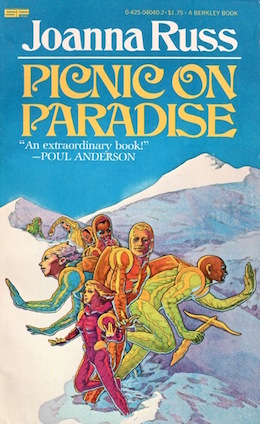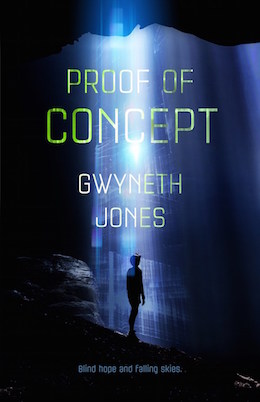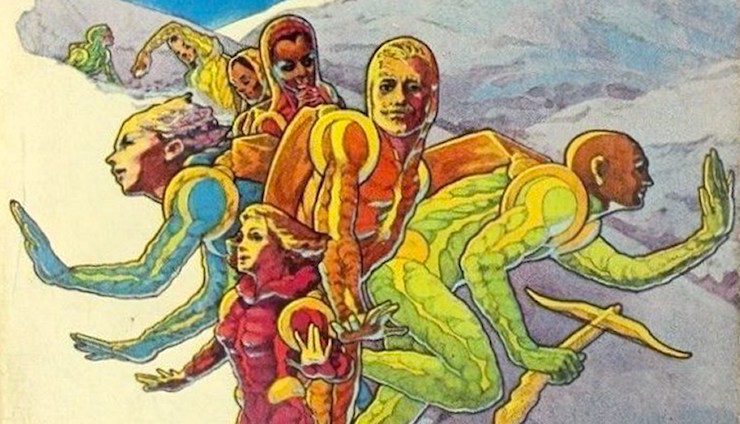The first Joanna Russ story I read was “When It Changed,” her famous account of a colonised planet where the men all died, and the women have found a new way of living. It touched a longing in me—except the partner I saw beside me, in a world free of gender roles, was my boyfriend. Later, I backtracked and enjoyed the “Alyx” adventures: stylish sword and sorcery, written in the Sixties, with a female protagonist. The fourth story, a slim novel called Picnic On Paradise, is a game-changer.
Alyx has been scooped out of S&S land (literally, scooped: snatched from an execution by drowning in the ancient Mediterranean by the mysterious Trans-Temp Miltiary Authority) and sent to the winter sports sector of a “resort planet,” where a group of tourists, stranded in a warzone, need to be couriered to an evacuation point. As the story opens she’s just arrived from TTMA HQ: through a Portal into a kind of Spaceport first-class lounge, all squirmy, eye-hurting mall-décor, and (to the eyes of this tough little Ancient Med sword-for-hire) bizarrely decorated, naked giants. The junior lieutenant in charge refuses to believe she’s the Trans Temp Agent. She convinces him by tying him in knots (weight and height don’t count against skill and daring, as Alyx is always happy to demonstrate), and strips off her shift in polite response to the tourists’ nakedness. Everyone’s horrified! “You have on your history,” explains the artist, Raydos, referring to her worn, scarred little body, “we’re not used to that.”
The civilians need an escort to Base B. The catch is that this contested planet, Paradise, is under fully automated, armed surveillance, No modern technology or transportation, no use of metal, or fire—anything unnatural will be annihilated. If anything moves in the sky, advises the Lieutenant, get down on your hands and knees and “pretend to be yaks.” On the plus side the trek, though snowbound, is short and fairly easy. When Alyx learns that a renowned outdoors expert is coming too, she wonders why she’s being wasted (the expense of that “scooping!”) on a picnic. The lieutenant says maybe Trans-Temp are testing her potential, and reveals that Gunnar, the media-star, is not the asset he seems. He’s never been without a crowd of helpers on hand on his previous “adventures.”
Off they set, provided with miraculous high-tech snowsuits and plenty of luxury trailfood. Big blond Gunnar challenges Alyx’s leadership, but when she’s proved she can hurt him, he develops an irritating crush instead. The older woman, Maudey, deprived of her rejuvenation drugs, frets non-stop. Maudey’s daughter Iris is a puppyish, 33-year-old adolescent. Raydos the artist has an eye implant that keeps going wrong. Gavrily the “Conaman” (or corporation man), never stops defending his war-profiteering, and the post-Buddhist nuns are rumoured to have a stash of dangerous mind-altering drugs. Alyx takes to walking with Machine, the young man who wears a “Trivia” helmet, so he can shut out a media-saturated world just for a bit of peace.
They reach Base B, and it’s been obliterated. The tourists have eaten all their rations; the map Alyx was given doesn’t cover the scary terrain ahead. They don’t even have spikes on their boots, and (as they’ll find out) it’s not entirely true that there are no hostiles on the surface. But Gunnar says there’s a Control Embassy three hundred miles further up, in the high mountains, and he claims to know the way, so they decide to go on. There’s really nothing else to do.
If you know anything about disaster movies, by this point you’re taking bets with yourself over who will be picked off first—and you’d be right. Count the casualties off as they go down. Admire the sneakily appropriate disasters that befall Alyx’s charges. Enjoy the (fiendishly awful) character conflicts and the mean twists. Nobody told Alyx that huge, aggressive alien-origin wild animals have been introduced to Paradise for sport.
 This is the book that convinced me, and others (Nancy Kress, Mary Gentle), that women can take on all the genre roles. It’s a brilliant, minimalist, character-driven action-adventure, enriched by the critique Russ sets up between her sci-fi future and her own reality, which is also ours. The self-obsessed tourists, “affluent, drug saturated technology junkies” (Marge Piercy) are just as recognisable in 2017. And if the “Commercial War” the “ebony-skinned” Lieutenant describes doesn’t make much sense, nor did a brutal proxy war in South East Asia—where too many dark-skinned young Americans were dying, for no good reason, in 1968 when Picnic was published.
This is the book that convinced me, and others (Nancy Kress, Mary Gentle), that women can take on all the genre roles. It’s a brilliant, minimalist, character-driven action-adventure, enriched by the critique Russ sets up between her sci-fi future and her own reality, which is also ours. The self-obsessed tourists, “affluent, drug saturated technology junkies” (Marge Piercy) are just as recognisable in 2017. And if the “Commercial War” the “ebony-skinned” Lieutenant describes doesn’t make much sense, nor did a brutal proxy war in South East Asia—where too many dark-skinned young Americans were dying, for no good reason, in 1968 when Picnic was published.
But the genuine innovation is Alyx’s leadership. She’s not a man in drag, a “girlfriend” or a pin-up posing in armour. She’s an exasperated, competent, sexy and reckless little woman of steel: as individual and convincing in the SF setting as she was in ancient “Ourdh”—and showing much more of herself, including a few fatal flaws. It helps that she’s pitted against cruel nature and human stupidity, not against a fantasy army, or a horde of monsters, but she’s never less than completely believable.
“What really differentiates Alyx from the other protagonists I’ve been talking about […] is not her sex, but her character. […] there is no doubt Alyx is a hero: tough, smart, practical, competent, brave. (And, notably, explicitly not conventionally beautiful, unlike most contemporary tough, smart, etc, female leads.) […] Nor does she suffer much internal anguish in these tales. In short, unlike her male counterparts, Alyx is not only someone you can root for, but someone you might actually be able to stand being.” (Niall Harrison, Torque Control)
The italics are mine: Niall Harrison’s point of difference explains the liberating, sexual-political impact of Alyx, more neatly than I could. Joanna Russ’s major feminist novels were still to come, but Picnic on Paradise, a classic by any standards, may well be the best work she ever did, simply for the cause of female writers and readers of SF.
Top image: cover art for Picnic on Paradise, 1979 Berkley edition; artist unknown.
 Gwyneth Jones is a writer and critic of genre fiction. She’s won the Tiptree award, two World Fantasy awards, the Arthur C. Clarke award, the British Science Fiction Association short story award, the Dracula Society’s Children of the Night award, the Philip K. Dick award, and the S.F.R.A. Pilgrim award for lifetime achievement in sf criticism. She also writes for teenagers, usually as Ann Halam. Her novella Proof of Concept is out now from Tor.com Publishing.
Gwyneth Jones is a writer and critic of genre fiction. She’s won the Tiptree award, two World Fantasy awards, the Arthur C. Clarke award, the British Science Fiction Association short story award, the Dracula Society’s Children of the Night award, the Philip K. Dick award, and the S.F.R.A. Pilgrim award for lifetime achievement in sf criticism. She also writes for teenagers, usually as Ann Halam. Her novella Proof of Concept is out now from Tor.com Publishing.










